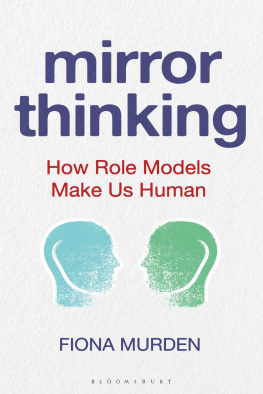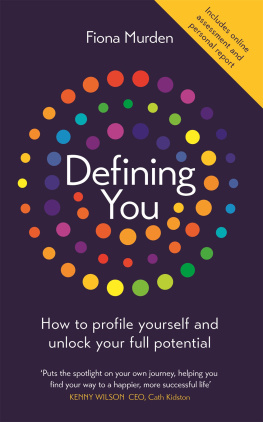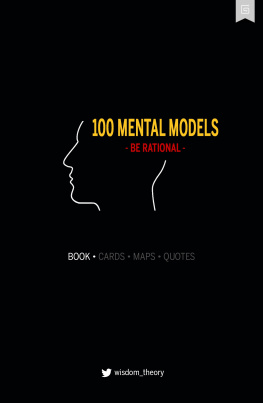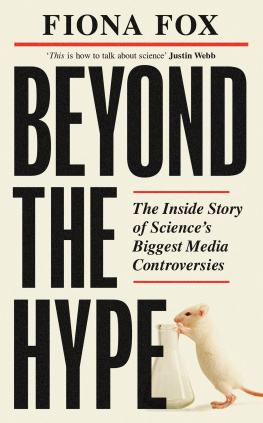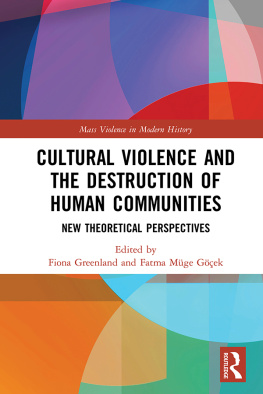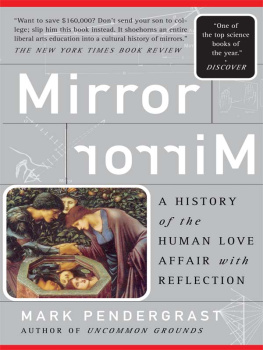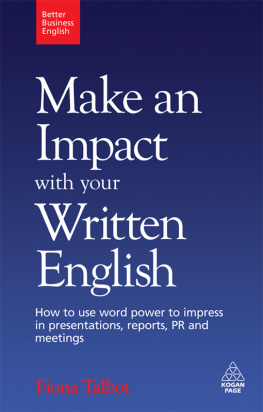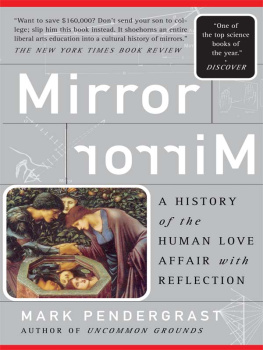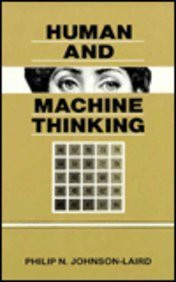Fiona Murden - Mirror Thinking: How Role Models Make Us Human
Here you can read online Fiona Murden - Mirror Thinking: How Role Models Make Us Human full text of the book (entire story) in english for free. Download pdf and epub, get meaning, cover and reviews about this ebook. year: 2020, publisher: Bloomsbury Publishing, genre: Home and family. Description of the work, (preface) as well as reviews are available. Best literature library LitArk.com created for fans of good reading and offers a wide selection of genres:
Romance novel
Science fiction
Adventure
Detective
Science
History
Home and family
Prose
Art
Politics
Computer
Non-fiction
Religion
Business
Children
Humor
Choose a favorite category and find really read worthwhile books. Enjoy immersion in the world of imagination, feel the emotions of the characters or learn something new for yourself, make an fascinating discovery.
- Book:Mirror Thinking: How Role Models Make Us Human
- Author:
- Publisher:Bloomsbury Publishing
- Genre:
- Year:2020
- Rating:4 / 5
- Favourites:Add to favourites
- Your mark:
- 80
- 1
- 2
- 3
- 4
- 5
Mirror Thinking: How Role Models Make Us Human: summary, description and annotation
We offer to read an annotation, description, summary or preface (depends on what the author of the book "Mirror Thinking: How Role Models Make Us Human" wrote himself). If you haven't found the necessary information about the book — write in the comments, we will try to find it.
Fiona Murden: author's other books
Who wrote Mirror Thinking: How Role Models Make Us Human? Find out the surname, the name of the author of the book and a list of all author's works by series.
Mirror Thinking: How Role Models Make Us Human — read online for free the complete book (whole text) full work
Below is the text of the book, divided by pages. System saving the place of the last page read, allows you to conveniently read the book "Mirror Thinking: How Role Models Make Us Human" online for free, without having to search again every time where you left off. Put a bookmark, and you can go to the page where you finished reading at any time.
Font size:
Interval:
Bookmark:


Also available in the Bloomsbury Sigma series:
Sex on Earth by Jules Howard
Spirals in Time by Helen Scales
A Is for Arsenic by Kathryn Harkup
Herding Hemingways Cats by Kat Arney
Death on Earth by Jules Howard
The Tyrannosaur Chronicles by David Hone
Soccermatics by David Sumpter
Big Data by Timandra Harkness
Goldilocks and the Water Bears by Louisa Preston
Science and the City by Laurie Winkless
Bring Back the King by Helen Pilcher
Built on Bones by Brenna Hassett
The Planet Factory by Elizabeth Tasker
Wonders Beyond Numbers by Johnny Ball
I, Mammal by Liam Drew
Reinventing the Wheel by Bronwen and Francis Percival
Making the Monster by Kathryn Harkup
Best Before by Nicola Temple
Catching Stardust by Natalie Starkey
Seeds of Science by Mark Lynas
Eye of the Shoal by Helen Scales
Nodding Off by Alice Gregory
The Science of Sin by Jack Lewis
The Edge of Memory by Patrick Nunn
Turned On by Kate Devlin
Borrowed Time by Sue Armstrong
We Need to Talk About Love by Laura Mucha
The Vinyl Frontier by Jonathan Scott
Clearing the Air by Tim Smedley
Superheavy by Kit Chapman
Genuine Fakes by Lydia Pyne
Grilled by Leah Garcs
The Contact Paradox by Keith Cooper
Life Changing by Helen Pilcher
Friendship by Lydia Denworth
Death by Shakespeare by Kathryn Harkup
Sway by Pragya Agarwal
Bad News by Rob Brotherton
Unfit for Purpose by Adam Hart

Contents
Thank you to Jo de Vries for her untiring support in pushing yet another idea through to reality. Emma for being there at the start. Anna for being a responsive and helpful editorial director and Emily a gentle copy editor. Professor Anthony Forster for the many stimulating conversations that always spark exciting trains of thought. All of the academics who have guided me on the mirror neurons functionality, most of all Professor Marco Iacoboni who has been generous, humble and brilliant.
Thanks to Brenda, a role model of positivity, Izzi for reading things while they still made no sense, Mum for being there for all of us. My girls I love you so much and Chris, you literally do complete me.
Thank you to all those who I have mirrored throughout my life, most of all the family who shaped my early years Peter, my Mum, my Dad, Gail and Malcolm.
There is a picture of me that I treasure. Its a bright early summers day, and Im sat on a picnic blanket with my grandfathers fedora drooped over my tiny two-year-old head and his thick-rimmed glasses sat crooked on my nose. He is looking back at me, my little yellow cherry-embroidered hat perched on the top of his head. Im told I put it there to make him smile, that it was the first time hed laughed since my nanna had died. Its comforting to think this is true, to picture myself as caring enough and sufficiently wise at that young age to know how to give him a momentary respite from his grief. In reality, I was probably just doing what every child does, copying what I saw and mirroring his behaviour unthinkingly. Thats what made him laugh.
This imitation is not just a human capability. To observe and copy what others in the clan are doing is essential to all learning. Have you ever noticed a kitten watching her mother clean herself only to try doing the same? Or you may have seen footage of a sea otter opening a shellfish with a rock. A young pup cannot do this until theyve witnessed the act and then tried it a few times themselves. This is the nature by which mammals know how to behave in different situations. We observe, imitate, assimilate and repeat, sometimes knowingly, but often without even noticing.
While on the surface this form of behaviour may appear basic and something we only do when were little, without it we would struggle to survive either as individuals or as a species. In fact, it is the power of mirroring that has enabled humanity to evolve to where it is today and conscious mirror thinking could be the key to unlocking the future of the human race; we just have to learn how to harness the incredible functioning of the mirror neuron system, embedded deep within our brains.
The brain and evolution
Increasingly, evidence points towards the human brain having evolved to the size it has in order to enable more effective social interaction, which in the time of our ancient ancestors aided our chances of survival. Being included within a larger group of people allowed humans to hunt bigger prey, choose from a wider range of sexual partners and watch out for lions or enemies with more pairs of eyes, as well as share the responsibilities of raising children and keeping them safe. The larger brain made it possible to store more information about different members of the tribe, to mentally hold a web of inter-relationships, to work out who was doing what with whom, who to avoid and who to befriend. All of these things are critical to getting along and cooperating with others and, as well explore, totally dependent on the mirror neuron system.
Along with making us more socially adept, this evolution of the human brain has also enabled us to share our learning to a greater extent than any other species. It makes sense that this knowledge transfer originally happened via social mechanisms, passing understanding on from generation to generation through watching, doing, storytelling and imagining within our own mind. Without this we simply would not be where we are today. We wouldnt have an iPhone or running water, antibiotics for an infection or aeroplanes to travel the world. This has all been built up from collective learning over thousands of years, which began at the most basic level. If we were to compare it to building a house, we had to put the foundations down before we could get anywhere near to putting a roof on. If we tried to construct the rafters with no frame it just wouldnt work.
Initially, we used our big brains to share knowledge about the most basic things for example, learning how to spark a flame. Being able to harness the power of fire took humans leaps and bounds ahead of other animals. As a species food sources were opened up because we could cook things that were previously inedible, we were able to take over previously uninhabitable territories by clearing dense undergrowth, and we could ward away predators and generate light and warmth. If a single person in one place had learnt to light a fire and no one else ever imitated that, the accidental finding may not have repeated itself for centuries. Without it being shared and built upon, it would literally have been no more than a glimmer. We carry out the same iterative knowledge transfer today. While we dont need to know how to survive in the wilderness, we are constantly learning about social norms and group dynamics, and passing them on to those around us.
Given that its our brain that permits this tutelage, its useful to understand how it is structured. The model I have always found most helpful to explain the brain remains one that was proposed back in the late 1960s. The late physician Paul MacLean established the triune brain theory to describe how the brains structure developed from our evolutionary beginnings up until the point at which these changes stopped about 50,000 years ago. MacLean proposed that our brain evolved to its current size and capability while preserving features of two much more basic
Font size:
Interval:
Bookmark:
Similar books «Mirror Thinking: How Role Models Make Us Human»
Look at similar books to Mirror Thinking: How Role Models Make Us Human. We have selected literature similar in name and meaning in the hope of providing readers with more options to find new, interesting, not yet read works.
Discussion, reviews of the book Mirror Thinking: How Role Models Make Us Human and just readers' own opinions. Leave your comments, write what you think about the work, its meaning or the main characters. Specify what exactly you liked and what you didn't like, and why you think so.

